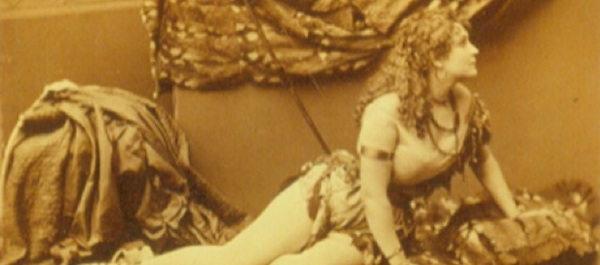
John Smith, who managed Albany’s Green Street Theater, titled himself captain though the only campaign he ever fought was in publicity. By June 1861 eleven southern states had seceded and formed the Confederacy. Fighting had begun on April 12th when Confederate forces fired on the Union garrison at Fort Sumter, South Carolina. Captain Smith quickly realized this meant good news for his theater.
Entertainment is a sadly neglected aspect of America’s Civil War. Its outstanding performer was Adah Isaacs Menken, aka “The Naked Lady,” whose life, celebrity, and writing epitomize the inner tensions of a war that split the nation.
On a Saturday afternoon Smith waited impatiently for the arrival of his star on the New York Central. She had been a smash hit in Chicago, Detroit, and Pittsburgh. Jitters caused by the menacing state of affairs increased the public’s desire for diversion, and Adah’s brand of light comedy, in which she quick-changed and played several parts, delighted audiences. The Chicago Tribune admired her “youth, beauty and wonderful flow of spirits, [her] dash and abandon of manner.” Adah’s notoriety helped to pack once empty theaters “from pit to dome.”
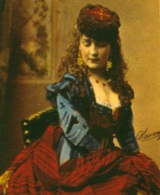 Adah’s life is a Cinderella story manqué. In 1835 she was born Adah Bertha Theodore to a kept woman of color (a “quadroon”) in New Orleans. According to Adah, and to her original modern biographer Allan Lesser, her father was Jewish. Interracial marriage was illegal, and the family moved to Texas, where Adah learned to ride and shoot. Her new stepfather, an Irishman, taught her to gamble and went broke. In her teens, Adah became the family’s sole support, as a circus performer. In April 1856, she married musician Alexander Isaac Menken, who knew little of her background, including a brief first marriage. Alex would manage the career of his budding actress-wife, but the depression of 1857 forced them to join his wealthy family in Cincinnati. Alex’s drinking drove the couple apart, and by summer 1859 Adah, having obtained a religious divorce, fled to New York. She kept only Alex’s name.
Adah’s life is a Cinderella story manqué. In 1835 she was born Adah Bertha Theodore to a kept woman of color (a “quadroon”) in New Orleans. According to Adah, and to her original modern biographer Allan Lesser, her father was Jewish. Interracial marriage was illegal, and the family moved to Texas, where Adah learned to ride and shoot. Her new stepfather, an Irishman, taught her to gamble and went broke. In her teens, Adah became the family’s sole support, as a circus performer. In April 1856, she married musician Alexander Isaac Menken, who knew little of her background, including a brief first marriage. Alex would manage the career of his budding actress-wife, but the depression of 1857 forced them to join his wealthy family in Cincinnati. Alex’s drinking drove the couple apart, and by summer 1859 Adah, having obtained a religious divorce, fled to New York. She kept only Alex’s name.
Ed James, editor on The Clipper, the Variety of its day, introduced Adah to handsome John Heenan, who claimed the American heavyweight boxing title. They fell in love and secretly married in September, becoming part of the sporting crowd that Horace Greeley’s Tribune described as “gamblers, brothel-masters and keepers of flash groggeries.” Adah was happy until early in 1860, when Heenan sailed off to fight the British champ, Tom Sayers. From this moment on “The Great Contest for the Championship of the World,” though illegal, was front-page news in every daily and weekly paper on both sides of the Atlantic. Held in April in a Hampshire meadow, the event drew a huge crowd that included celebrities and members of Parliament. Since Britain favored the South in the impending Civil War, and Heenan had come to represent the Union, the bare-knuckles bout took on political significance. Bold headlines about the match dwarfed brief reports about John Brown being hanged in Virginia for insurrection.
After thirty-six brutal rounds Heenan was the clear victor, when the constables charged into the ring. The fighters accepted a draw and toured Britain as sparring partners. Meanwhile Adah, billed as Mrs. John Heenan, combined a song and dance act with a pep rally for the champ. Starting at the Bowery Theater, she toured major cities in the East to packed houses and wild cheers. However, Adah was carrying John’s child, and he refused to answer her letters. Her poetry, published by Robert Newell in his prestigious Sunday Mercury, shows her depressed and lonely. Still, she found time to pen an essay, “Swimming Against the Current,” in defense of her friend Walt Whitman, whose poetry was despised as obscene.
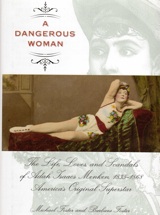 In August, John Heenan returned to New York to a crowd of 50,000 chanting “Tiger! Tiger! Tiger!” as they carried their hero aloft. Flags flew and a brass band blared to honor America’s first great sports hero. Lincoln and Douglas, campaigning for the presidency, were forgotten, but so was Adah. John’s boy child, just born, soon died. Heenan, parading his English mistress, denied he had married Adah, calling it “a good joke on a bad subject.” Worse, Alex Menken claimed Adah was still married to him and that she was a bigamist! The press turned against Adah, theaters barred her, and she was soon desperate in a Jersey City hovel. She attempted suicide but was rescued by Newell, who became her fourth husband.
In August, John Heenan returned to New York to a crowd of 50,000 chanting “Tiger! Tiger! Tiger!” as they carried their hero aloft. Flags flew and a brass band blared to honor America’s first great sports hero. Lincoln and Douglas, campaigning for the presidency, were forgotten, but so was Adah. John’s boy child, just born, soon died. Heenan, parading his English mistress, denied he had married Adah, calling it “a good joke on a bad subject.” Worse, Alex Menken claimed Adah was still married to him and that she was a bigamist! The press turned against Adah, theaters barred her, and she was soon desperate in a Jersey City hovel. She attempted suicide but was rescued by Newell, who became her fourth husband.
First, a court trial erupted over Heenan’s responsibility for Adah’s bills. His attorney claimed that John had merely dallied with Adah, who was “the most dangerous woman in the world.” We have borrowed this Victorian euphemism for a loose woman as the title of our new biography: A Dangerous Woman: The Life, Loves and Scandals of Adah Isaacs Menken (1835 – 1868). The trial, avidly covered by the press, led to another American institution: the front-page sex scandal. Two-penny papers hawked by newsboys in the streets brought the scandal into every parlor. Enhanced by the invention of photography, the new media revolutionized American life. Adah, guided by Ed James on The Clipper, seized the opportunity, turning notoriety into worldwide fame.
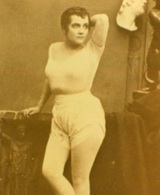 In Albany, John Smith was delighted by Adah’s arrival and play, which was Mazeppa, a popular drama taken from a historical poem by Byron. Prince Mazeppa was a tribal freedom fighter warring against the tyranny of the Russian Czar. The part had always been played by a man. In the key scene Mazeppa is surrounded by his enemies, stripped bare, tied to a wild stallion, and sent up a four-story stage mountain. Chased by wolves and vultures, the horse proceeds up a narrow ramp, making the act so dangerous it was performed by tying on a dummy. Adah performed the ride in the flesh, wearing a nude pink bodystocking. In the press, Adah—“The Naked Lady”—her courage and esprit, produced the smash stage hit of the Civil War, and it ran into the twentieth century. Then movies celebrated the Mazeppa legend: Actresses from Ruth Roman to Sophia Loren and Rachel McAdams have played Adah or characters based on her. The marriage of nudity with danger is irresistible.
In Albany, John Smith was delighted by Adah’s arrival and play, which was Mazeppa, a popular drama taken from a historical poem by Byron. Prince Mazeppa was a tribal freedom fighter warring against the tyranny of the Russian Czar. The part had always been played by a man. In the key scene Mazeppa is surrounded by his enemies, stripped bare, tied to a wild stallion, and sent up a four-story stage mountain. Chased by wolves and vultures, the horse proceeds up a narrow ramp, making the act so dangerous it was performed by tying on a dummy. Adah performed the ride in the flesh, wearing a nude pink bodystocking. In the press, Adah—“The Naked Lady”—her courage and esprit, produced the smash stage hit of the Civil War, and it ran into the twentieth century. Then movies celebrated the Mazeppa legend: Actresses from Ruth Roman to Sophia Loren and Rachel McAdams have played Adah or characters based on her. The marriage of nudity with danger is irresistible.
During the early, bleak years of the Civil War Adah toured from New York to the Midwest and border states, packing major theaters so that advance ticketing was introduced. The newspapers heaped praise on her style, voice, and poetry. She distributed her patriotic verse before every performance. In Baltimore, near the front lines, she entertained hospitalized Union troops. Mazeppa, containing pitched battles in which the heroic prince triumphs over the forces of evil, gave hope and courage to civilians and soldiers. Mazeppa seemed to be the warrior general whom President Abraham Lincoln searched for but could not find. At the front lines, the lads pinned up martial and sexy photos of Adah, and dreamed of returning to sweethearts.
In pro-Confederacy Baltimore, Adah posted photos of Confederate generals in her dressing room. Was this a statement of allegiance, a publicity stunt, or the romanticism of the Southern cause? The Union provost–marshal had Adah arrested, but her popularity was too intense to hold her. Adah married the ultra-respectable Robert Newell and accepted an unheard-of offer from Tom Maguire’s San Francisco Opera House: She would receive one-third of the gate. This made Menken the highest paid actress in the world.
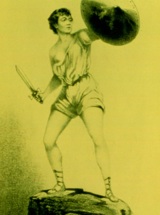 As Adah debarked at San Francisco in August 1863, she found the cosmopolitan mother of boomtowns decked out in her praise. A band played, men fired pistols in the air, and nearly every storefront displayed a poster of her as Mazeppa. She instantly caught the golden city’s “go for broke” spirit to her resounding success. On opening night Adah astounded the audience, crowded into and around the Opera House, with her maximum daring and minimal clothing! Cub reporter Sam Clemens (Mark Twain) described Adah’s appeal: “A magnificent spectacle dazzled my vision—the whole constellation of the Great Menken came flaming out of the heavens and shed a glory abroad as it fell! I have used the term ‘Great Menken’ because I regard it as a more modest expression than the ‘Great Bare.’” (We used Mark Twain’s pun as the name of our website about Adah and her tempestuous times: www.TheGreatBare.com.)
As Adah debarked at San Francisco in August 1863, she found the cosmopolitan mother of boomtowns decked out in her praise. A band played, men fired pistols in the air, and nearly every storefront displayed a poster of her as Mazeppa. She instantly caught the golden city’s “go for broke” spirit to her resounding success. On opening night Adah astounded the audience, crowded into and around the Opera House, with her maximum daring and minimal clothing! Cub reporter Sam Clemens (Mark Twain) described Adah’s appeal: “A magnificent spectacle dazzled my vision—the whole constellation of the Great Menken came flaming out of the heavens and shed a glory abroad as it fell! I have used the term ‘Great Menken’ because I regard it as a more modest expression than the ‘Great Bare.’” (We used Mark Twain’s pun as the name of our website about Adah and her tempestuous times: www.TheGreatBare.com.)
Let Captain Smith have the last word: “After six weeks fine business in Albany, Menken played the part in New York and then in London and Paris, where, as I have been told, she dazzled some of the brightest men in Europe.” The poor girl from New Orleans would rise to the heights of superstardom, disappointed only in love.
About MICHAEL FOSTER and BARBARA FOSTER
We first met Adah Menken on an oversized postcard in London’s Theater Museum. Bound to a stallion rearing at the edge of a cliff, Adah was young, beautiful, and wearing very little. The reverse side informed us that it portrayed a scene from the melodrama Mazeppa, in which Adah played the historical freedom fighter, Prince Mazeppa. As the sworn biographers of heroic women, including our earlier The Secrets Lives of Alexandra David-Neel (an explorer of Tibet), we were quickly sold on this, our next project. We, the authors, are holders of advanced degrees and academic positions, but both scholarship and perseverance—and sometimes courage—are needed to reveal the public and private lives of these women who fought for us all. Presently, Barbara is at work on her memoir, and Michael on a fairy tale for grown-ups.




